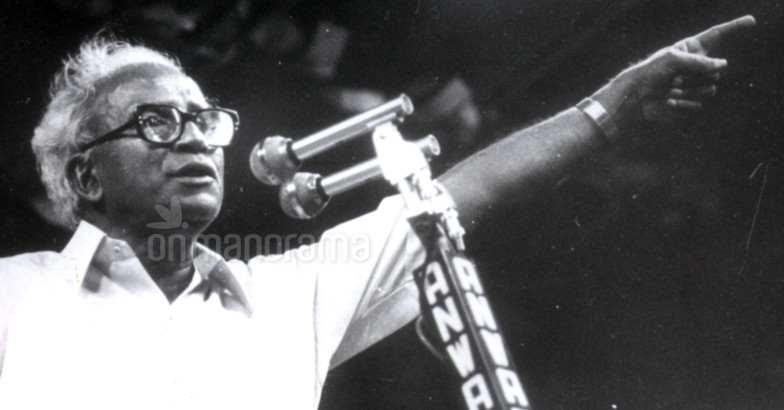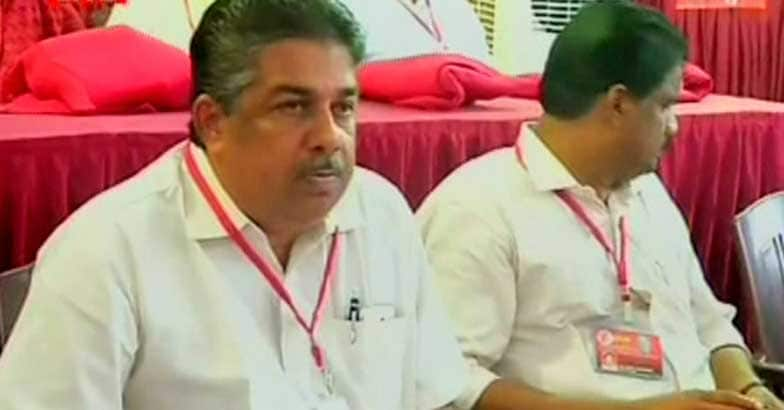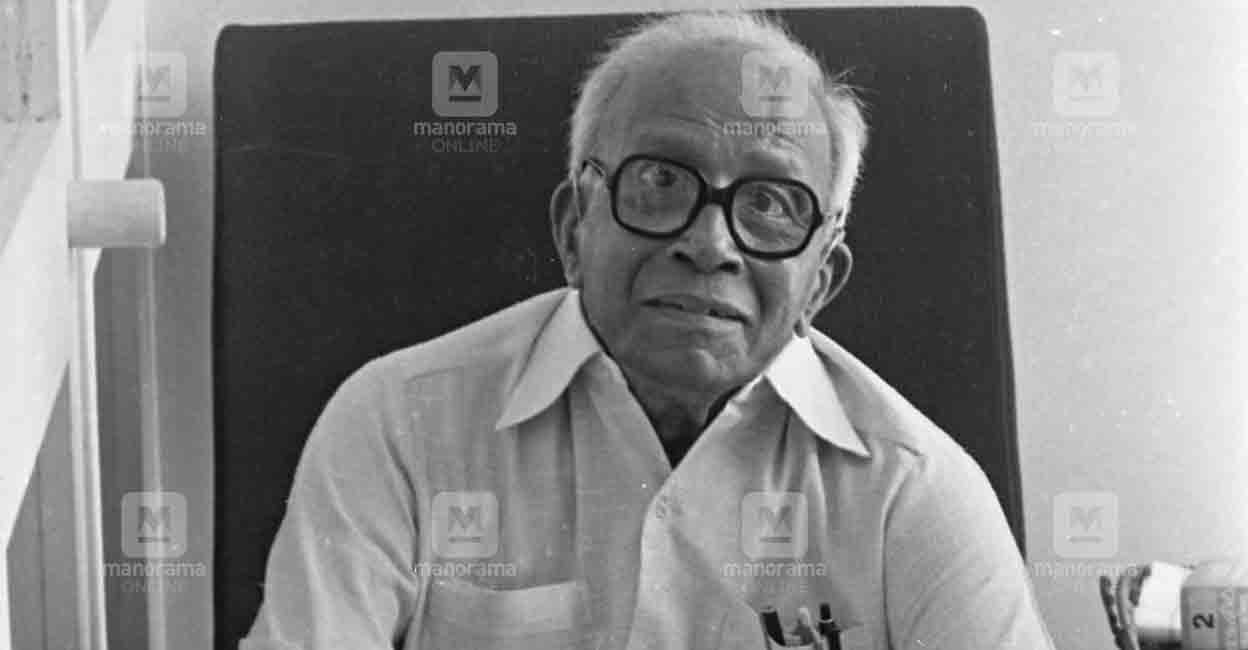CPM and Constitution. Saji Cheriyan is not the first CPM blasphemer

Mail This Article
What is surprising is not that former Kerala culture minister Saji Cheriyan refused to apologise for his blasphemy. The surprise is, Kerala expected Cheriyan and his party, the CPM, to say sorry.
The CPM can quickly and firmly condemn the attack on Rahul Gandhi's office in Wayanad by its own boys, but not an attack on the Constitution. The first (vandalising opposition offices) is at least not official party policy but the second one (criticising the Constitution), in a sense, is.
The CPM has always been openly suspicious of the transformational potential of the Indian Constitution. The party's misgivings, given voice in its official documents and by ideologues like E M Sankaran Namboodirippad, have made one thing evident: that for the CPM, the nation's 'holy text' has its redeeming qualities but still is only of marginally higher value than the holy books the Marxists generally shun.
Untrustworthy tome
The party's official attitude towards the Indian Constitution was more like what celestial beings in myths had for anything earthly. EMS himself had once remarked that followers of Marxism-Leninism did not have revulsion for parliamentary democracy even if they had a sympathetic distrust towards its effectiveness. He was Chief Minister of Kerala then, and the last word on CPM ideology.
All that Cheriyan said at the Mallappally meeting on July 3 were already said by CPM stalwarts, though not in the unfiltered crude way in which he put it.
“As far as we are concerned, the nation is inherently defective. The problems lie ingrained in the nation structure carved out of the Constitution,” EMS had said, while delivering a lecture at Pune's Gokhale Institute in 1968 when he was Chief Minister. “The many controls squeezed inside the constitutional framework will ambush revolutionary and progressive policies,” he had added.

Saving grace
Yet, Saji Cherian's absolute disdain is far from CPM policy. The party has acknowledged the many things good about the Indian Constitution. “Universal adult franchise and parliament and state legislatures can serve as instruments of the people in their struggle for democracy, for defence of their interests. When there have been attacks on parliamentary democracy, such as the internal emergency, the people have opposed such authoritarian measures,” the current CPM Programme says.
There is grudging respect, too. “Although a form of class rule of the bourgeoisie, India's present parliamentary system also embodies an advance for the people. It affords certain opportunities for them to defend their interests, intervene in the affairs of the State to a certain extent and mobilise them to carry forward the struggle for democracy and social progress,” it says.

Next best option
Though the adoption of the Constitution is seen as a step forward, EMS had said that his party was not under the illusion that the bourgeois-landlord classes would patiently allow working class and democratic organisations to achieve radical social change using parliamentary means.
For the CPM, therefore, parliamentary democracy is acceptable as a stop-gap arrangement, just as useful as a small stone to drive a nail into the wall in the absence of a hammer.
But the tool seems infuriatingly inefficient for the CPM. The Directive Principles of State Policy, which speaks of a paradise-like welfare state is not enforceable. Even enforceable rights are brutally denied, according to the CPM.
“All the fundamental rights guaranteed to us have been violated, except property rights,” EMS has once said publicly. “Mind you, it is not the property rights of small and middle-income farmers or workers that have not been trampled upon but that of the landed gentry and the rising moneyed class,” he said.
Rich man's saviour
Right from the time of EMS, the CPM has held up the Supreme Court verdict in the 1967 Golaknath case as a telling example of how the Constitution protects the property rights of the rich.
The Golaknath family in Punjab owned 500 acres of farmland. However, in 1953, the Punjab government passed the Punjab Security and Land Tenures Act, which limited individual land possession to 60 acres. The Golaknaths, like many rich landholding families in Punjab, were asked to part with excess land.
The Golaknaths went to court, challenging the validity of the 1953 Act. They argued that their fundamental right to property was violated. (Then, right to property was part of fundamental rights. It was removed from the list by the 44th amendment, in 1978.) Not only did the apex court rule in favour of the Golaknaths, it also stripped the Parliament of its power to make amendments to Part III of the Constitution that deals with the fundamental rights of the citizens.
The CPM has seen in this proof that radical and transformational policy changes are virtually impossible under the Indian Constitution.

Dilemma of courts
While the top court stood up for the fundamental rights of the rich, the CPM has argued that it stood helpless when the most important fundamental right, personal liberty, was at stake.
The party had way back in 1962 questioned the authoritarian nature of the Defence of India Act that was passed during the Sino-India War of 1962. This war legislation gave the government untrammelled powers to jail suspected traitors and deny them all fundamental rights. Being an emergency provision, even the courts had no right to intervene. The party had the same criticism about the Armed Forces Special Powers Act, which gave the army unquestioned authority over north-eastern states.
In general, the party was so frustrated with the Constitution that in one of its documents, it is stated that even if the representatives of the working class secure a majority in the Parliament, comprehensive changes should be made in the functioning of the Constitution to achieve meaningful social and economic transformations.

Change of tactics in Modi era
All this while, the Sangh Parivar, too, was mulling changes in the Constitution. If the CPM called their Constitution-altering scheme 'working class'-centric, the BJP unabashedly called it Hindu-centric. The BJP's designs, though considered outrageous by the CPM, were largely ignored till Narendra Modi came to power in 2014.
Legislations like the Citizenship Amendment Bill, the Muslim Women (Protection of Rights on Marriage) Act, and the withdrawal of Article 370 told the CPM in no uncertain terms that the Constitution, which it distrusted, was worth fighting for.
The party went into a tactical silence on the Constitution till Cheriyan made that jarring noise on July 3.



